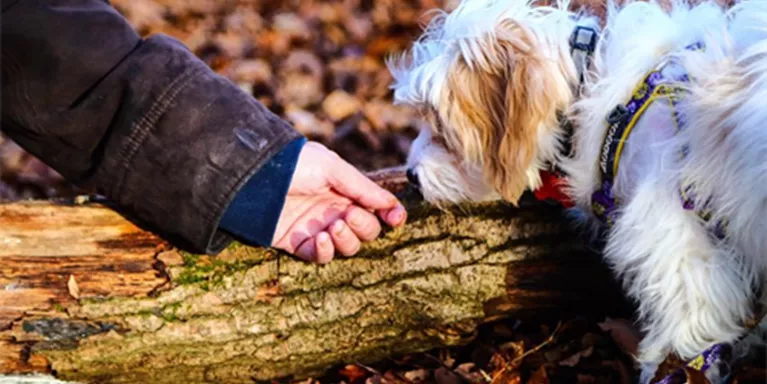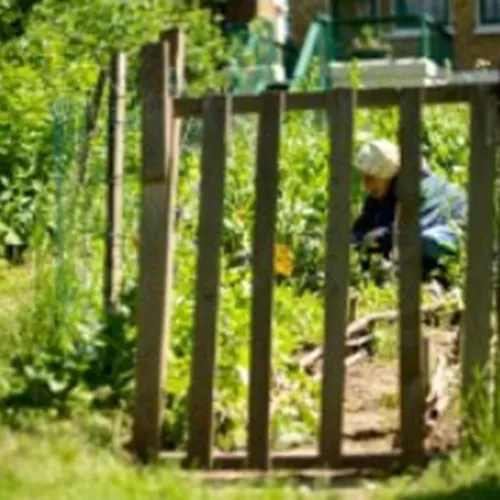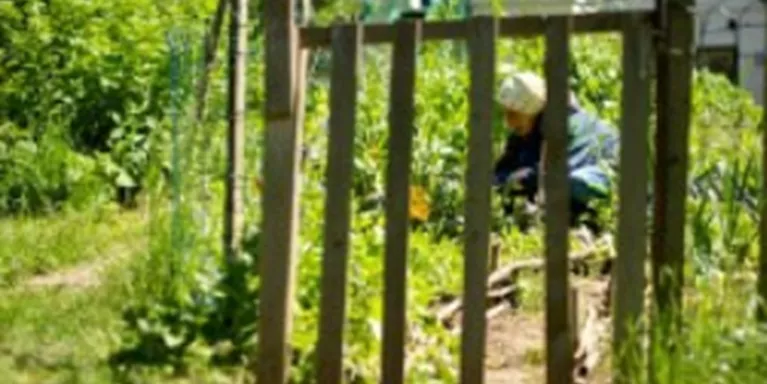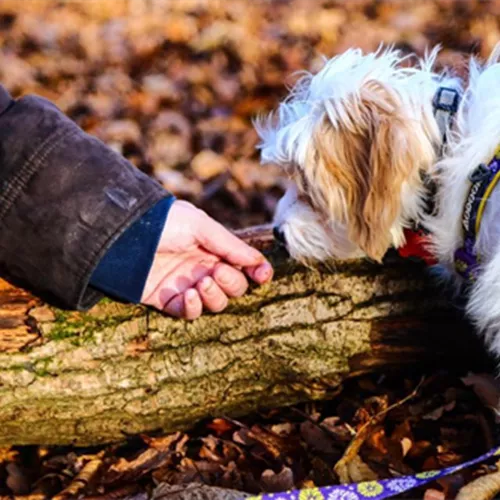Nature and mental health
Explains how nature can help your mental health. Gives tips and ideas to try, and suggests where to go for more information.
View this information as a PDF (new window)
What nature ideas could I try?
This page has some tips and suggestions for enjoying nature. Don't worry if some ideas don't feel right for you. See if you can find some that do, or adapt one to suit you.
I love watching the garden change. The difference I make when I dig a bed, plant something or even cut the grass. And honestly I'm no gardener! An easy way for everyone to connect with outside is to watch the birds. Put out a bird feeder to attract them. Otherwise just get outside, blow the cobwebs away, breathe deeply. Bliss.
Grow or pick food
- Create a growing space. If you don't have access to a garden, you could plant salad leaves or herbs in a window box or plant pot.
- Plant vegetables in your garden. The Thrive website has information to help you get started.
- Grow food together with others. Apply to share an allotment, or look for community gardens or food growing projects in your local area. See the National Allotment Society, Social Farms & Gardens or your local council's website for more information.
- Go fruit picking. Look for local farms or orchards that let you pick fruit to buy. You might also find fruit growing in urban spaces, for example wild blackberries.
- Learn to find edible plants, known as food foraging. You could see if a foraging group meets in your local area. The Woodland Trust website has more information on foraging.
I very much enjoy being part of a community garden. It gives me a regular weekly time to devote to being outdoors, to work alongside people of lots of different ages and nationalities. It teaches me new skills and techniques. It's fantastic to work as part of a larger group, to see positive results in terms of seed and plant growth. And to harvest and feel part of the natural cycle of life. To see biodiversity at work.
Bring nature indoors
- Buy flowers or potted plants for your home.
- Collect natural materials. For example, leaves, flowers, feathers, tree bark or seeds. Use them to decorate your living space or in art projects.
- Arrange a comfortable space to sit. For example, by a window where you can look out over a view of trees or sky.
- Grow plants or flowers on windowsills. See the Royal Horticultural Society website for tips on planting seeds indoors.
- Take photos of your favourite places in nature. Use them as backgrounds on a mobile phone or computer screen. Or print them and put them up on your walls.
- Listen to natural sounds. You could use recordings or apps that play birdsong, ocean waves or rainfall.
- Watch videos of nature. You could try virtual walks or livestreams of wildlife.
I started out by just finding an empty and unused space in the garden outside my window and tending to it.
Do activities outdoors
- Take a walk in green space. For example, a local park.
- Get creative. Draw or paint animals or nature scenes, or let them inspire a poem or song lyrics. If you enjoy writing in a journal, try doing this outside.
- Eat meals outdoors. Have a picnic in a local park, or sit in a garden if you have one. This might be something you could enjoy doing with other people.
- Watch the stars. Use a stargazing website, app or book to help you recognise different stars, or simply enjoy looking at the night sky. Give your eyes time to adjust, as it can take about 20 minutes before you can fully see stars in the dark.
- Exercise outside. Run or jog through a local park, or do yoga outdoors. You could try it by yourself, or look for classes in your local area.
- Join a local walking or rambling group. There are lots of different organised walking groups. For example, Ramblers or Black Girls Hike.
- Follow a woodland trail. See the Forestry Commission England and Natural Resources Wales (Cyfoeth Naturiol) websites to look for woodland near you.
- Go beachcombing. Visit the seaside and search the shoreline for interesting things.
- Try geocaching. Geocaching involves looking for items in hidden outdoor locations, using a mobile phone or tablet. For more information on geocaching see the National Trust website.
It can also be helpful to find out if your local area runs any ecotherapy programmes.
Hill walking and camping help to keep depression and anxiety at bay for my partner, as does trekking and gentle hill walking for me. When you are in nature your mind is free of the daily stresses and you can spend your time being in the moment instead.
I use photography as a creative outlet to express myself and support my health. It helps you to be mindful in the moment and rediscover the beauty in your own surroundings. Like noticing the resilience of a flower growing with determination though a crack in concrete, or capturing the beauty of raindrop patterns. The process of observing the outside world breaks the cycle of being caught up with negative internal dialogue.
Help the environment
- Go on a litter picking walk. For example, in the park or on the beach.
- Volunteer for a conservation project. For suggestions see The Wildlife Trusts, Groundwork and The Conservation Volunteers websites.
- Plant helpful seeds. For example, berry bushes for garden birds or flowers to help bumblebees. See the Bumblebee Conservation Trust website for more information on bumblebees.
- Build an animal habitat. For example, a hedgehog house or a bird box. Or create a pond if you have space.
- Try upcycling. Get creative and find a new purpose for your rubbish. The Royal Society for the Protection of Birds (RSPB) website has suggestions on upcycling for nature.
I started volunteering on Saturdays when I was in a really low frame of mind, and it really helped me recover more quickly. I work full-time in an office during the week so doing something so active in such a different environment is a lovely contrast.
Take notice of nature
- Find things you can see, hear, taste, smell or touch. For example, grass under your feet or the feeling of wind and sunlight.
- Keep a record of what you notice. Take photos or make notes in a diary or on your phone.
- Set yourself challenges. For example, you could try to notice three things in nature each day.
- Listen to recordings of mindfulness exercises. Our information on mindfulness and taking a mindful moment in nature have more tips.
- Think about what you are grateful for. It can be easy to take nature for granted. You could note your thoughts in a gratitude journal or take pictures.
- Try to minimise distractions. For example, you could listen to the sounds around you rather than putting headphones in.
Crouching in the garden, getting dew and soil on my hands and smelling the lovely, earthy smells is one of the only times I can feel at ease without wanting earphones in to cancel the noise of my busy brain.
Connect with animals
- Watch out for wildlife. If you don't live near open countryside, try visiting a local park to look for squirrels, fish, insects, ducks and other birds.
- Visit a local community or city farm. You might be able to help out by volunteering. See the Social Farms & Gardens website for more information.
- Hang a bird feeder outside a window. If there's space, you could build a small wooden nesting box on a tree or under a windowsill.
- Try birdwatching. You don't need any special equipment. See the RSPB website for more information on feeding, sheltering and watching birds.
- Try pet-sitting or dog walking. Offer to be a pet sitter in your local neighbourhood, volunteer to walk dogs for an animal shelter, or ask to borrow a friend's dog for occasional evening or weekend walks.
- Take part in a nature survey. This might involve counting birds, animals or insects in a particular time and place, or reporting individual sightings of wildlife. See the Big Garden Birdwatch, Bumblebee Conservation Trust and Big Butterfly Count for examples of nature surveys.
Being outside, feeding rabbits, talking to the donkeys and looking after sick lambs. It's incredibly grounding, no matter what my state of mind. Getting muddy in all weathers, breathing fresh air. Proudly talking to visitors about the animals and being part of the seasonal cycle of a farm. It's been been life-changing.

How getting a dog saved my life
The daily walking helps me organise my thoughts, and become more aware of my environment.
The mindfulness of dogs
Watch Clare talk about how her dog, Watson, reminds her of some important principles of mindfulness:
It gives you perspective and makes you feel connected with something much bigger than yourself, which I find very comforting.
This information was published in November 2021. We will revise it in 2024.
References and bibliography available on request.
If you want to reproduce this content, see our permissions and licensing page.















